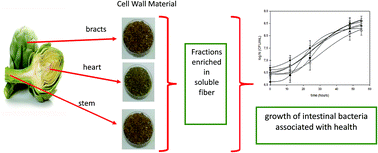A study of the effect of dietary fiber fractions obtained from artichoke (Cynara cardunculus L. var. scolymus) on the growth of intestinal bacteria associated with health
Abstract
The effect of different fractions enriched in soluble fiber obtained from artichoke using citric acid or citric acid/hemicellulase on the selective growth of Lactobacillus plantarum 8114 and Bifidobacterium bifidum ATCC 11863 was evaluated. Gompertz modeling of Lactobacillus plantarum 8114 growth showed a higher specific growth rate (μ: 0.16 h−1) in the presence of fractions isolated from stems using hemicellulase (fraction A) than in the presence of glucose (μ: 0.09 h−1). In the case of Bifidobacterium bifidum 11863, the highest μ was obtained for the microorganism grown in the presence of fraction A and for the fraction isolated from stems without hemicellulase, their rate being twice that observed for glucose (0.04 h−1). The positive prebiotic activity scores observed with respect to Escherichia coli 25922 indicated that fibers assayed are metabolized as well as glucose by Lactobacillus plantarum 8114 and Bifidobacterium bifidum ATCC 11863 and that they are selectively metabolized by these microorganisms. The potential capacity to selectively stimulate the growth of intestinal bacteria associated with health shown by fraction A can be ascribed to its high inulin and low methylation degree pectin contents.


 Please wait while we load your content...
Please wait while we load your content...